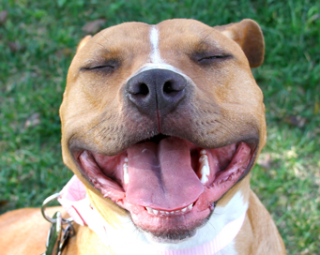You are here
What is an ANGEL CITY pit bull?

The term ‘pit bull’ originally referred to the American Pit Bull Terrier - a wonderful breed of dog that is at the root of many breeds that now fall under the ‘pit bull’ umbrella. More often, pit bull (notice the lowercase lettering), is a generic term for several closely related breeds or even less specific, as anything that even looks like a ‘pit bull’.
Most Los Angeles shelters use the term pit bull to cover anything that looks like one including the American Pit Bull Terrier, American Staffordshire Terrier, Staffordshire Bull Terrier, the recently created American Bully, as well as mixed breed dogs of varying backgrounds. Angel City Pit Bulls recognizes that through prolific backyard breeding, we don’t know what is in the genetic mix of the shelter dogs we are working with. While we believe we can visually identify dogs whose genetic mix is mostly APBT, AST, SBT, etc and sometimes see dogs that appear to be of specific ‘blood-lines’, there is no reliable way to test their genetic background.
Angel City Pit Bulls takes in dogs (mainly from our local shelters) that fall under the generic term pit bull who demonstrate people-soft, responsive qualities and solid temperaments. Their adorableness and gushy love of people make them fantastic family dogs. We have a wide range of energy levels, so whether you are looking for a running partner or a potential “therapy dog”, we will typically have a dog that will fit the bill.
All dogs, including pit bulls, fall somewhere on a spectrum of dog tolerance - anywhere from totally dog social to truly dog aggressive. Our dogs are no different, some are social and friendly with new dogs right from the start and others need to take things more slowly. Most of the ACPB dogs live in multi-dog foster homes, preferring the company of other well-matched dogs and some even with well-matched cats.
When it comes to adopting, we are happy to help you find the right match for your situation and help with canine or feline introductions. We encourage adopters to know and work within your dog’s limits, be a good dog parent through positive leadership and training, and continue to responsibly socialize your dog.





